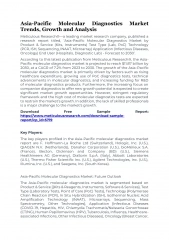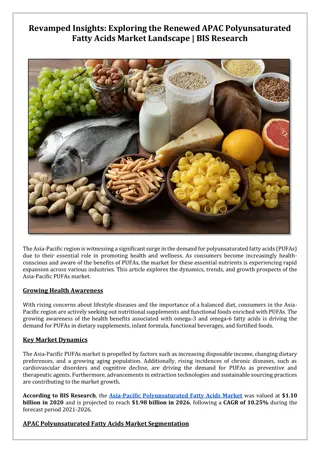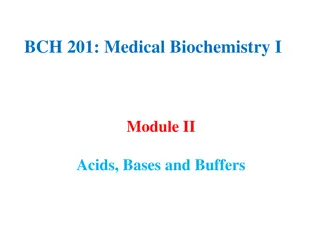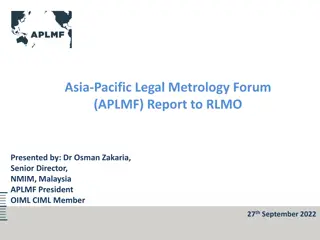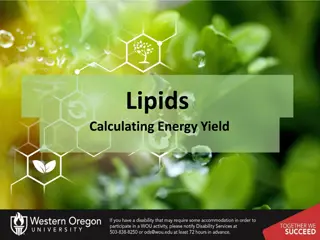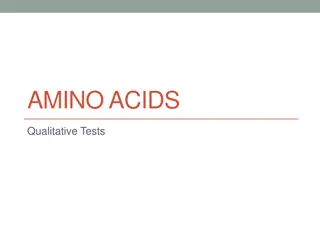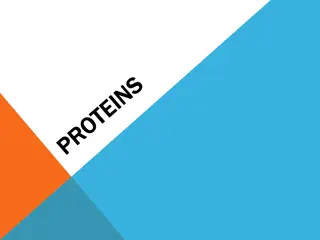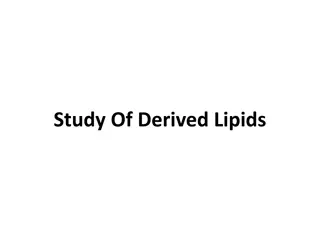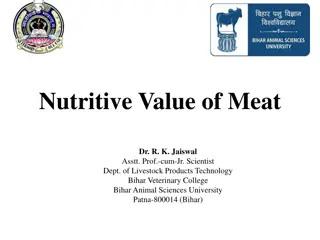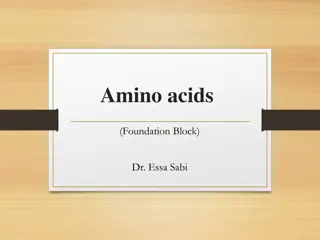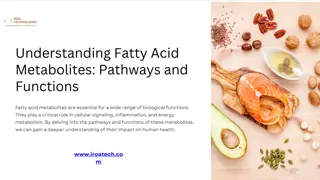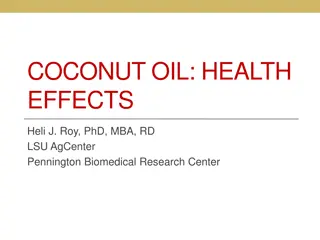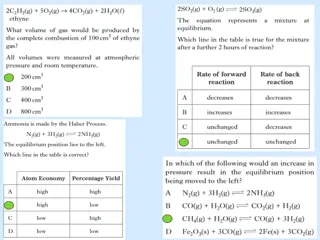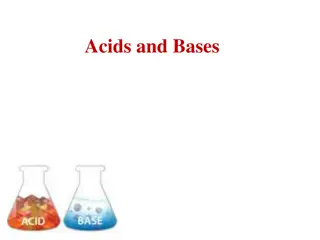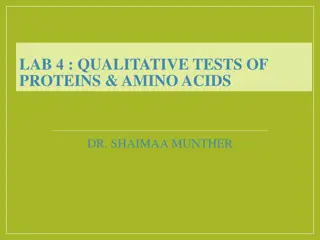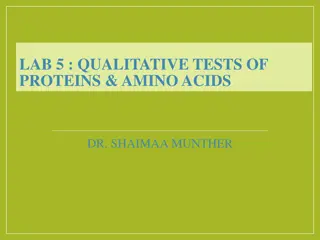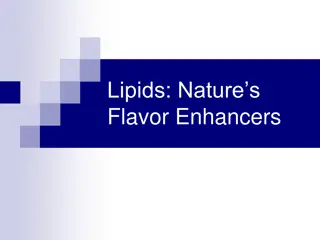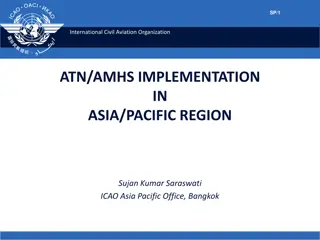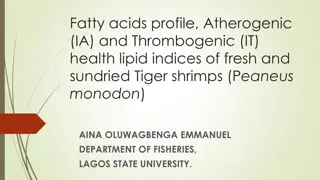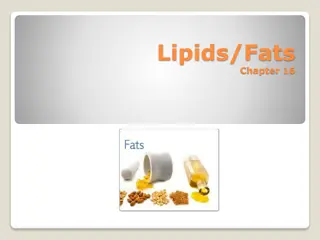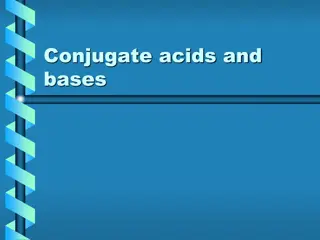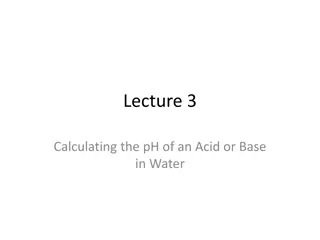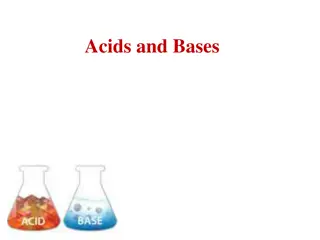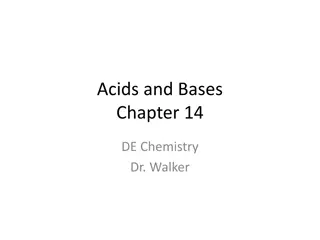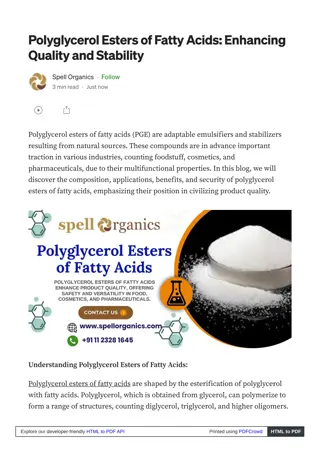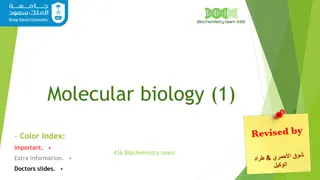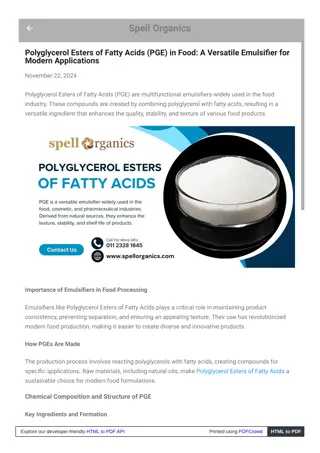Asia-Pacific Molecular Diagnostics Market
Asia-Pacific Molecular Diagnostics Market\nAsia-Pacific Molecular Diagnostics Market by Product & Service (Kits, Instruments) Test Type (Lab, PoC) Technology (PCR, ISH, Sequencing, INAAT, Microarray) Application (Infectious Diseases, Oncology) End User (Hospitals, Diagnostic Lab)
0 views • 3 slides
Maximize Wellness with Omega 3 6 9 Tablets The Essential Hea
In today's fast-paced world, prioritizing our health is more critical than ever. Fortunately, a trio of essential fatty acids \u2013 omega-3, omega-6, and omega-9 \u2013 can offer a powerful boost to your overall well-being. \n\n \n\nConveniently available in omega 3 6 9 tablets, these fatty acids
2 views • 5 slides
Understanding Lipids: Properties, Functions, and Types
Lipids are a diverse group of organic compounds that include fats, oils, hormones, and components of cell membranes. They are vital for energy storage, structural roles in cell membranes, hormone synthesis, and organ protection. Lipids can be classified into different types such as waxes, triglyceri
11 views • 14 slides
Revamped Insights: Exploring the Renewed APAC Polyunsaturated Fatty Acids Market
According to BIS Research, the Asia-Pacific Polyunsaturated Fatty Acids Market was valued at $1.10 billion in 2020 and is projected to reach $1.98 billion in 2026, following a CAGR of 10.25% during the forecast period 2021-2026.
5 views • 2 slides
Understanding Acids, Bases, and Buffers in Medical Biochemistry
Biologically important molecules, such as acids and bases, have significant roles in metabolism. Strong acids like hydrochloric acid ionize completely, while weak acids and bases play crucial regulatory roles. The Bronsted-Lowry theory defines acids as proton donors and bases as proton acceptors. Eq
0 views • 29 slides
Understanding Lipids: Importance, Digestion, and Absorption
Professor Shraddha Singh's lecture series delves into the significance of lipids, the types of lipids, and the role of bile in digestion. Learn about saturated vs. unsaturated fatty acids, common fatty acids found in lipids, lipid structures, and properties. Explore the diverse types of fats we cons
2 views • 32 slides
Asia-Pacific Legal Metrology Forum (APLMF) Activities Report 2022
Asia-Pacific Legal Metrology Forum (APLMF) is focused on supporting the Asia-Pacific Economic Cooperation (APEC) goals through the development of legal metrology and promotion of free trade. In 2022, APLMF activities are conducted using the Zoom platform, with a pilot eLearning module for Non-automa
0 views • 13 slides
Energy Yield from Lipid Oxidation Process
Understanding the energy generation process from lipid oxidation involves the conversion of fatty acids into Acetyl-CoA through multiple rounds of oxidation, which then enter the Krebs cycle to produce ATP. Each round of oxidation results in the production of Acetyl-CoA, NADH, FADH2, and net gains o
0 views • 7 slides
Understanding Amino Acids: Qualitative Tests and Properties
Amino acids play a crucial role as building blocks of proteins and can be converted into specialized products. There are 20 common L-α-amino acids found in mammalian proteins, each with a unique structure and classification based on their side chain properties. Amino acids exhibit optical activity,
0 views • 34 slides
Amino Acid: Structure and Classification Overview
Amino acids are essential building blocks of proteins, with only 20 out of the 300 occurring in nature being used for protein synthesis. The structure of amino acids consists of four groups attached to a central carbon atom. At physiological pH, these groups can ionize, forming zwitterions. Amino ac
0 views • 24 slides
Understanding Fatty Acids and Derived Lipids
Explore the world of fatty acids and derived lipids through detailed images and descriptions. Learn about the chemical structure, composition, and various types of fatty acids found in the human body. Discover how fatty acids are essential components of lipid forms and play a crucial role in biologi
0 views • 154 slides
Understanding Lipids: Properties, Functions, and Structure
Lipids are diverse organic compounds vital for metabolism and cell functions. They are insoluble in water, serve as energy sources, aid in hormone synthesis, and form cell membranes. Fatty acids, the building blocks of lipids, provide fuel for the body. Saturated fatty acids have high melting points
0 views • 44 slides
Understanding Lipid Compounds and Their Physiological Significance
Explore the world of lipid compounds and their vital roles in the body, including serving as a major energy source, structural components of cell membranes, and key regulatory molecules. Learn about various types of lipids, such as fatty acids, phospholipids, and lipoproteins, and their relevance to
0 views • 24 slides
Understanding the Nutritive Value of Meat: A Comprehensive Overview
Meat is a highly nutritious food, rich in high-quality proteins, essential fatty acids, minerals, and B-complex vitamins. This article delves into the proximate composition, caloric value, protein content, essential amino acids, fats, fatty acids, and mineral composition of meat, highlighting its si
0 views • 12 slides
Understanding Amino Acids: Structure, Classification, and Properties
Amino acids are crucial chemical units that form proteins and play essential roles in the body. They consist of a carboxyl group and an amino group, serving as building blocks and metabolic intermediates. This article covers the general structure, zwitterions, isoelectric point, pK values, and class
0 views • 26 slides
Understanding Fatty Acid Metabolites Pathways and Functions
This article explores the complex biochemical pathways involved in the metabolism of fatty acids and their conversion into various metabolites. Fatty acid metabolites play essential roles in cellular energy production, signaling, and structural funct
0 views • 9 slides
Understanding the Health Effects of Coconut Oil
Coconut oil, derived from mature coconuts, is rich in saturated fats and widely used in food, medicine, and industry. Fatty acids play crucial roles in human health, with different types impacting metabolism differently. Coconut oil's unique fatty acid composition sets it apart from oils like corn o
0 views • 18 slides
Understanding Fats and Oils: Properties and Formation
Learn about the properties of fats and oils, including their formation through a condensation reaction of glycerol with fatty acids. Explore the role of fats in the diet, different types of natural fats and oils, and the chemical composition of triglycerides. Discover the significance of fatty acids
0 views • 17 slides
Understanding Acids and Bases in Chemistry
Acids donate protons, while bases accept them. Strong acids ionize completely while weak acids only partially ionize, resulting in a Ka value less than one. Water, being amphoteric, can both donate and accept protons. The ionization of water leads to a constant Kw value of 10^-14. Explore the ioniza
0 views • 15 slides
Water and Sanitation in Asia Pacific: Updates and Activities
The document highlights updates and activities related to Water and Sanitation in the Asia Pacific region, focusing on regional planning, operational plans, human resources, recent activities, and development opportunities. It includes information about the Asia Pacific Regional Office, key staff me
0 views • 9 slides
The Role of Asia-Pacific Disability Constituency in Regional Mechanisms
The Asia-Pacific Disability Constituency plays a crucial role in regional mechanisms by advocating for the rights of persons with disabilities in the United Nations High Level Political Forum. Through platforms like the Asia-Pacific Regional Civil Society Mechanism (AP-RCEM), they ensure diverse voi
0 views • 9 slides
Enhancing Economic Statistics in Asia-Pacific Region
The Regional Programme on Economic Statistics aims to improve economic statistics in the Asia-Pacific region by enhancing capacity and coordination among National Statistical Offices (NSOs) and other stakeholders. The programme focuses on implementing the Core Set of Economic Statistics to facilitat
0 views • 11 slides
Qualitative Tests of Proteins & Amino Acids: Overview and Analysis
In this lab, you will delve into the qualitative tests for proteins and amino acids, understanding their structures, classifications, and importance in food and human nutrition. The tests include solubility tests and identification tests for both amino acids and proteins, revealing their presence an
0 views • 13 slides
Qualitative Tests of Proteins & Amino Acids - Lab Analysis Overview
This lab analysis covers qualitative tests for proteins and amino acids, including solubility tests and identification tests for amino acids and proteins. Specific tests like Ninhydrin test for -L amino acids, Xanthoproteic test for aromatic amino acids, and lead sulfite test for sulfhydryl group de
0 views • 13 slides
Understanding Fatty Acid Oxidation in Zoology Department with Miss Punam Patil
Explore the process of fatty acid oxidation in zoology, including the entry of fatty acids into mitochondria, TCA cycle outcomes, and differences between mitochondrial and peroxisomal oxidation. Learn about the oxidation of saturated, monounsaturated, and polyunsaturated fatty acids through detailed
0 views • 9 slides
Understanding Lipids: Nature's Flavor Enhancers
Lipids, a category of organic compounds, are essential for enhancing flavors in food. They contain carbon, hydrogen, and oxygen but do not dissolve in water. Lipids come in three general types - triglycerides, phospholipids, and sterols. They consist of glycerol and fatty acids, with variations like
0 views • 38 slides
Pacific Best Practice Guidelines for CRVS Legislation and Recent Developments
Core priority for the Pacific region is updating outdated legislation for Civil Registration and Vital Statistics (CRVS) systems. Many Pacific countries are revising their laws with support from partners to comply with modern standards, like the Asia-Pacific CRVS Decade. Major acts and regulations a
0 views • 9 slides
Implementation of ATN/AMHS in Asia-Pacific Region: Strategies and Progress
Explore the progressive initiatives in implementing ATN/AMHS in the Asia-Pacific region as outlined by the International Civil Aviation Organization. The strategic adoption, communication ground-to-ground strategies, ATN over OSI and ATN over IPS conclusions, dual-stack protocols integration, and th
0 views • 20 slides
Fatty Acids Profile and Health Lipid Indices of Tiger Shrimps
Seafood lipids, including Tiger shrimps like Peaneus monodon, are rich in essential fatty acids such as EPA, DHA, and AA. This study focuses on the fatty acids profile, atherogenic (IA), and thrombogenic (IT) health lipid indices of fresh and sundried Tiger shrimps, shedding light on the effects of
0 views • 19 slides
Understanding Lipids and Fats in Nutrition
Lipids are essential compounds found in every living cell, categorized into triglycerides, sterols, and phospholipids. Triglycerides play a vital role in absorbing and transporting vitamins, energy storage, and cushioning organs. Understanding the difference between saturated and unsaturated fats is
0 views • 16 slides
Pharma Focus Asia Magazine: Insights for Pharma Industry Leaders
Explore how Pharma Focus Asia magazine caters to the needs of pharmaceutical industry leaders by providing strategic insights, research updates, and information on development, manufacturing, clinical trials, and technology. Discover why the Asian market is becoming a focal point for global pharma o
0 views • 10 slides
Understanding Acids and Bases in Chemistry
Acids and bases play essential roles in chemistry, where they release hydrogen ions or hydroxide ions when mixed with water. Acids, like vinegar and lemon juice, are corrosive and can cause chemical burns. On the other hand, bases, such as bleach and dish soap, contain the hydroxide group in their f
0 views • 19 slides
Understanding Conjugate Acids and Bases in Chemistry
Explore the concept of conjugate acids and bases in chemistry through definitions, reactions, and examples. Learn how to identify strong and weak acids/bases based on their conjugates and understand the behavior of acids/bases in reverse reactions. Discover the significance of conjugate acids/bases
0 views • 22 slides
Understanding pH Calculations for Acids and Bases in Water
Acids and bases play crucial roles in chemical reactions by involving the transfer of protons. This lecture explains the definitions of acids and bases, general acid-base reactions in water, and how the pH scale is used to measure the acidity or basicity of a solution. It covers how acids and bases
0 views • 42 slides
Understanding Acids and Bases: Ionization and Properties
Acids donate protons while bases accept them. Strong acids and bases ionize completely, while weak acids ionize partially. Water is amphoteric, capable of both accepting and donating protons. The equilibrium constant Kw for water is 10^-14. Understanding the ionization of weak acids and weak bases h
0 views • 15 slides
Understanding Acids and Bases in Chemistry: Key Concepts and Terminology
This chapter delves into the fundamental concepts of acids and bases in chemistry, covering Arrhenius, Bronsted-Lowry, and Lewis definitions. It discusses conjugate acids and bases, acid dissociation, dissociation of strong and weak acids, and the differences between strong and weak acids/bases. The
0 views • 41 slides
Polyglycerol Esters of Fatty Acids: Key to Enhanced Product Stability
Polyglycerol esters of fatty acids (PGE) are versatile, natural emulsifiers used widely in food, cosmetics, and pharmaceuticals. At Spell Organics, we harness Polyglycerol Esters of Fatty Acids to elevate product stability, consistency, and shelf lif
0 views • 11 slides
Understanding Nucleic Acids and the Central Dogma of Molecular Biology
In molecular biology, understanding nucleic acids like DNA and RNA is crucial for comprehending the central dogma, which explains the flow of genetic information from DNA to RNA to proteins. Nucleic acids are polymers of nucleotides, composed of pentose sugar, nitrogenous bases, and phosphate groups
0 views • 18 slides
Qualitative Tests of Lipids and Derived Lipids Overview
Qualitative tests of lipids distinguish between oil, neutral fat, saturated fatty acids, and unsaturated fatty acids using methods like the copper acetate test. Derived lipids include substances like cholesterol and fat-soluble vitamins that are either soluble in lipids or derived from lipids throug
0 views • 14 slides
Polyglycerol Esters of Fatty Acids: Enhancing Quality Across Food Products
Polyglycerol Esters of Fatty Acids (PGE) are essential in improving the quality and consistency of various food products. These multifunctional emulsifiers enhance texture, stabilize emulsions, and prolong shelf life, making them vital for bakery, co
0 views • 4 slides
